
"When Doves Cry" is a song by American musician Prince, and the lead single from his sixth studio album Purple Rain. According to the DVD commentary of the film Purple Rain (1984), Prince was asked by director Albert Magnoli to write a song to match the theme of a particular segment of the film that involved intermingled parental difficulties and a love affair. The next morning, Prince had composed two songs, one of which was "When Doves Cry". According to Prince's biographer Per Nilsen, the song was inspired by his relationship with Vanity 6 member Susan Moonsie.

Laid Back is a Danish electronic music duo group from Copenhagen, formed in 1979. The duo consists of John Guldberg and Tim Stahl. They are best known for the hits "Sunshine Reggae" and "White Horse" from 1983 and "Bakerman" from 1989.

"Thriller" is a song by the American singer Michael Jackson. It was released by Epic Records in November 1983 in the UK and on January 23, 1984 in the U.S., as the seventh and final single from his sixth studio album of the same name. It is a funk song featuring a repeating synthesizer bassline and lyrics evoking horror films, with sound effects such as thunder, creaking doors and wolf howls. It ends with a spoken-word sequence performed by the horror actor Vincent Price. It was produced by Quincy Jones and written by Rod Temperton, who wanted to write a theatrical song to suit Jackson's love of film.
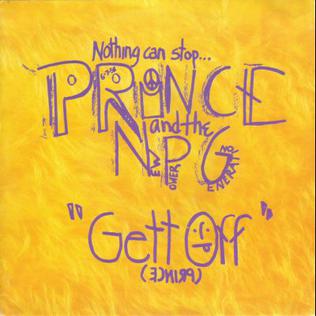
"Gett Off" is a song written and produced by American musician Prince, released in June 1991 as the lead single from his thirteenth album, Diamonds and Pearls (1991). The album was his first with his backing band the New Power Generation. "Gett Off" was a hit on both sides of the Atlantic, reaching number four in the United Kingdom; the maxi-single was too long and pricey to appear on the UK Singles Chart, so this release was classified as an album, peaking at number 33 on the UK Albums Chart in August 1991.

"White Lines (Don't Don't Do It)" is a song by American hip hop recording artist Melle Mel, released as a 12" in 1983 on Sugar Hill Records. The song, which warns against the dangers of cocaine, addiction, and drug smuggling, is one of Mel's signature tracks. The bassline is taken from a performance of the Sugar Hill house band (featuring bassist Doug Wimbish) covering "Cavern", a single by New York City band Liquid Liquid.
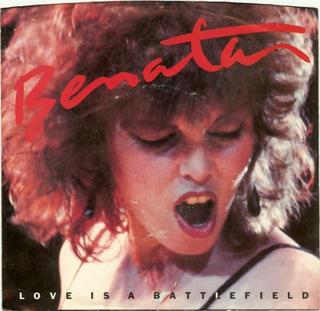
"Love Is a Battlefield" is a song by American singer Pat Benatar, recorded and released on September 12, 1983, as a single from Benatar's live album Live from Earth (1983), though the song itself was a studio recording. It was written by Holly Knight and Mike Chapman. The song was ranked at number 30 in VH1's list of the 100 Greatest Songs of the 1980s. "Love Is a Battlefield" went on to sell over a million records.
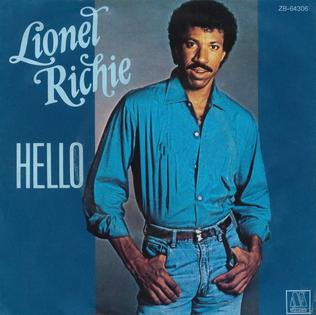
"Hello" is a song by American singer and songwriter Lionel Richie. Taken as the third single from his second solo album, Can't Slow Down (1983), the song was released in 1984 and reached number one on three Billboard music charts: the pop chart, the R&B chart, and the Adult Contemporary chart. The song also went to number one on the UK Singles Chart for six weeks.

"The Glamorous Life" is a song written by Prince, recorded by American percussionist Sheila E. and produced by both. The song has lyrics which reflect a cynicism for the decadence and materialism of the song's protagonist, referred to in the third person, who "wants to lead a glamorous life", although she is aware that "without love, it ain't much".

"Let's Hear It for the Boy" is a song by Deniece Williams that appeared on the soundtrack to the feature film Footloose. The song was released as a single from both the soundtrack and her album of the song's same name on February 14, 1984, by Columbia Records. It was written by Tom Snow and Dean Pitchford and produced by George Duke. The song became Williams' second number one on the US Billboard Hot 100 on May 26, 1984, also topping the dance and R&B charts, and peaked at number two on the UK Singles Chart, behind "Wake Me Up Before You Go-Go" by Wham!. It was nominated for an Academy Award for Best Original Song, and was certified platinum in the US and gold in Canada and the UK by the Recording Industry Association of America, Music Canada and the British Phonographic Industry, respectively. The music video was released in mid-April 1984. The song features background vocals from George Merrill and Shannon Rubicam, who would go on to form the duo Boy Meets Girl.

"Ain't Nobody" is a song by American funk band Rufus and American singer Chaka Khan. It was released on November 4, 1983, as one of four studio tracks included on their live album, Stompin' at the Savoy (1983). "Ain't Nobody" quickly gathered popularity, and reached number one on the US Billboard R&B chart and number 22 on the US Billboard Hot 100. In 1984 at the 26th Annual Grammy Awards, "Ain't Nobody" won for Best R&B Performance by a Duo or Group with Vocal. It has become one of Khan's signature songs.
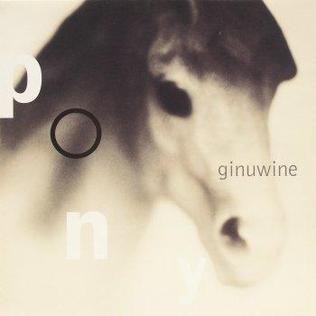
"Pony" is a song by American singer Ginuwine, released as the debut single from his first album, Ginuwine...The Bachelor (1996). Ginuwine co-wrote the song with Swing Mob associates Static Major and Timbaland; the latter made his breakthrough as a producer with the song. It peaked at number six on the US Billboard Hot 100 and number two on the Billboard Hot R&B Singles chart.
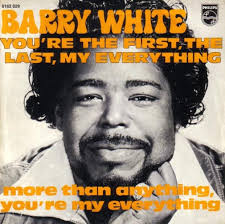
"You're the First, the Last, My Everything" is a song recorded by American singer and songwriter Barry White from his third studio album, Can't Get Enough (1974). The song was written by White, Tony Sepe and Peter Radcliffe and produced by White. It reached number two on the US Billboard Hot 100 and number one on the UK Singles Chart. The song was certified Gold by the Recording Industry Association of America (RIAA) in 1974, and certified silver by the British Phonographic Industry (BPI), also in 1974.
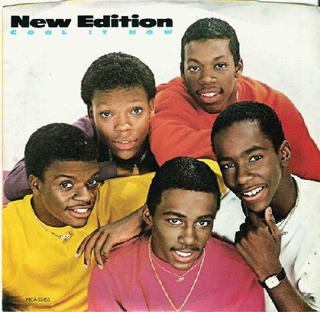
"Cool It Now" is a 1984 hit single by American group New Edition, and is the first single from their eponymous second album, New Edition. In the US, the song entered the Hot Black Singles chart on September 1, 1984. The song peaked at number 4 in January 1985 on the Billboard Hot 100 chart. Lyrically, the song depicts a guy professing his love for a girl, despite growing concerns from his friends.

"Such a Shame" is a song written by Mark Hollis for the English band Talk Talk's second album It's My Life (1984). It was released as the album's second single and went on to become a top 10 hit across Europe.
"Pony Time" is a song written by Don Covay and John Berry, and originally recorded in 1960 by Covay with his group "the Goodtimers".

"Rumors" is a song by San Francisco Bay Area-based music group Timex Social Club, from their debut album Vicious Rumors. It was a top-10 hit in the United States, Canada, Ireland, the Netherlands, and New Zealand, reaching No. 8 on the US Billboard Hot 100. It also topped the US R&B and dance charts.
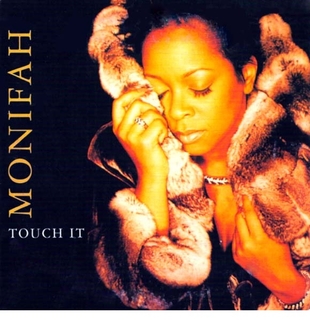
"Touch It" is the lead single from American R&B singer Monifah's second album, Mo'hogany. The song was produced and written by Jack Knight and Screwface. It uses a sample of Laid Back's 1983 hit "White Horse", so songwriters Tim Stahl and John Guldberg are given writing credits.

"I'm Gonna Tear Your Playhouse Down" is a song written by Memphis-based songwriter Earl Randle, and first recorded in 1972 by soul singer Ann Peebles. The song was also a hit in 1984 for English singer Paul Young.

"Sicko Mode" is a song by American rapper Travis Scott. It features vocals from Canadian rapper Drake, who was credited on Apple Music but not on the Billboard Hot 100 or Spotify. It was originally released by Epic Records on August 3, 2018, as the third track from Astroworld (2018), before being released as the second single on August 21. It features additional uncredited vocals by fellow American rappers Swae Lee and the late Big Hawk.
"Sunshine Reggae" is a song written and recorded by Danish electronic music duo Laid Back. It was originally released as a single in July 1983 and released on their second album Keep Smiling (1983). As an international summer hit of 1983, it is the band's most successful song.

















